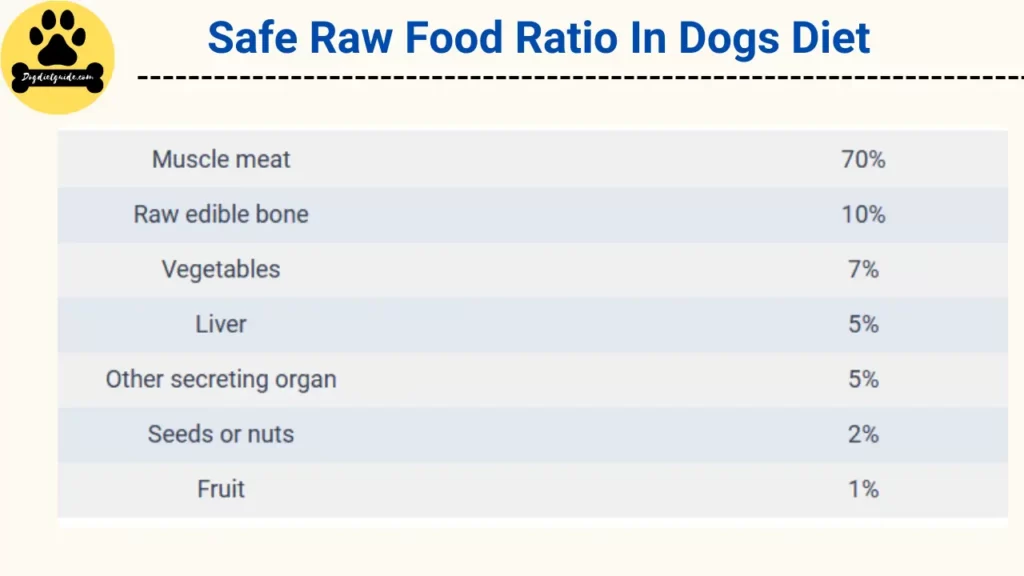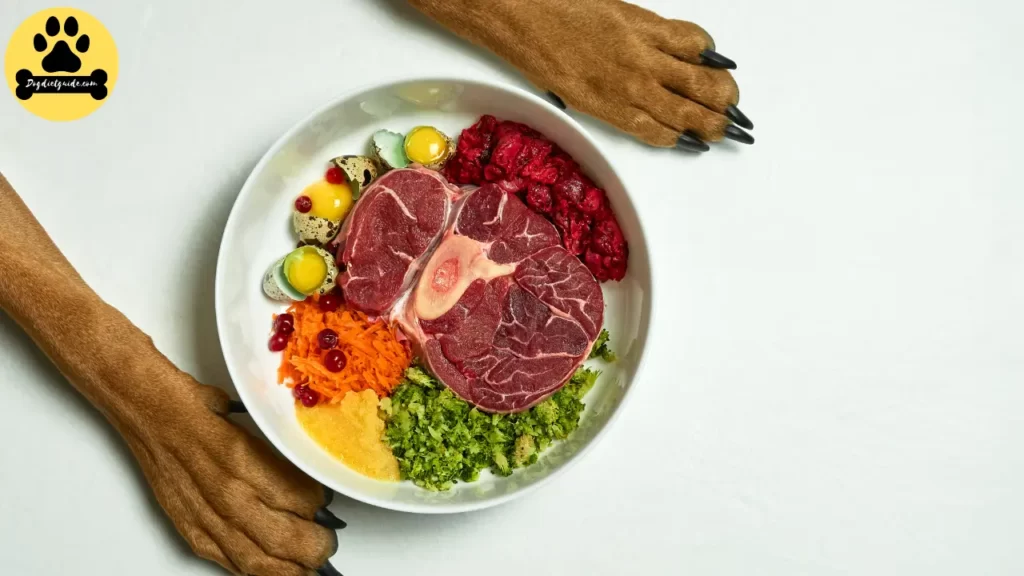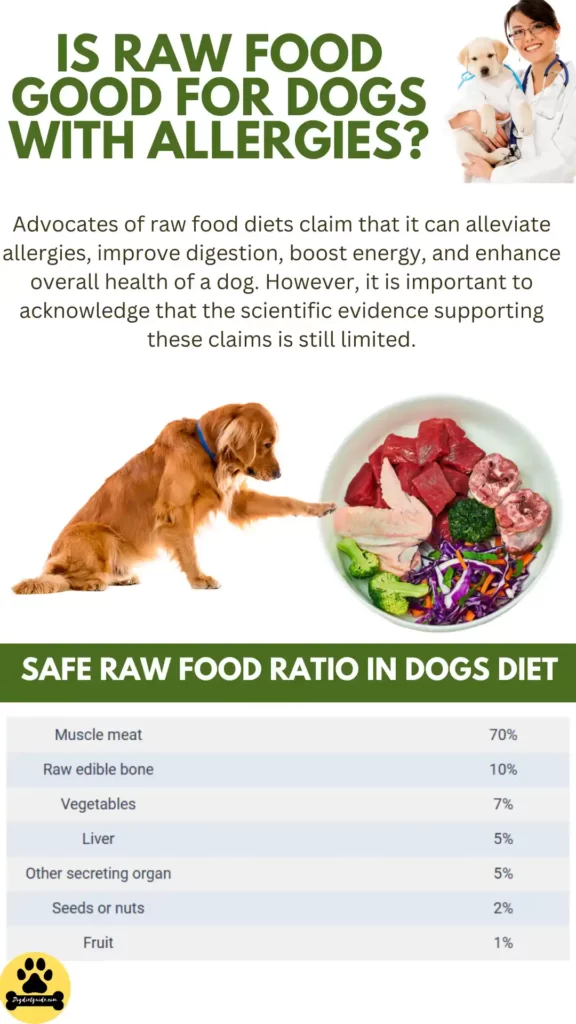As a devoted dog owner, you want the best for your furry friend. However, when your beloved canine companion suffers from allergies, finding the right diet can become challenging. In recent years, the popularity of raw food diets for dogs has surged, with many pet owners considering it as a potential solution to address allergies and enhance the overall health of their furry companions. But Is Raw Food Good for Dogs with Allergies?
Canine Nutritionists Claims on Raw Dog Food
Advocates of raw food diets claim that it can alleviate allergies, improve digestion, boost energy, and enhance overall health of a dog. However, it is important to acknowledge that the scientific evidence supporting these claims is still limited.
Before we dive into the raw food diet discussion, it’s crucial to understand dog allergies. Canine allergies can manifest in various forms, such as skin irritation, itching, excessive licking, hot spots, ear infections, and gastrointestinal issues. Common allergens include:
- Certain proteins (e.g., beef, chicken, and dairy).
- Grains (e.g., wheat, corn, and soy).
- Environmental factors (e.g., pollen and dust mites).
Allergic reactions in dogs can vary widely in severity, making it vital to identify the specific triggers and provide appropriate solutions.
Is Raw Food Good for Dogs with Allergies?
A raw food diet, also known as a “BARF” diet (Biologically Appropriate Raw Food), mimics the diet of dogs’ wild ancestors, primarily consisting of raw meat, bones, organs, fruits, and vegetables.
Some canine nutritionists claim that raw food can alleviate allergies, improve digestion, boost energy, and enhance overall health. However, scientific evidence supporting these claims is still limited. Therefore, pet owners must carefully consider raw food diets for dogs, weighing the potential benefits and risks before making any significant dietary changes for their beloved furry friends.

What is Meant by Raw Dog Food?
An enhanced raw dog food diet usually includes a variety of nutrient-rich ingredients carefully selected to meet a dog’s nutritional needs. The diet typically comprises:
- Muscle meat, which often includes meat still attached to bones, provides essential protein and amino acids.
- Bones, whole or ground, promote dental health and supply necessary minerals like calcium and phosphorus.
- Organ meats, like livers and kidneys, offer vital vitamins and minerals such as iron, vitamins A and B.
- Raw eggs are a great source of protein, omega-3 fatty acids, and biotin for a shiny coat and healthy skin.
- Nutrient-packed vegetables like broccoli, spinach, and celery, provide vitamins, fiber, and antioxidants for overall well-being.
- Fruits like apples or other varieties offer natural sweetness and additional vitamins and minerals.
- Some dairy options, like yogurt, support gut health and provide calcium and probiotics in moderation.
Safe Raw Food Ratio In Dogs Diet
| Muscle meat | 70% |
| Raw edible bone | 10% |
| Vegetables | 7% |
| Liver | 5% |
| Other secreting organ | 5% |
| Seeds or nuts | 2% |
| Fruit | 1% |
Potential Benefits of Raw Food Diets for Dogs with Allergies
- Limited Processing and Allergens
- Omega-3 Fatty Acids
- Improved Digestion
- Potential Weight Management
- Better Nutrient Absorption
Raw food diets often eliminate common allergens in commercial dog food, such as grains and artificial additives, potentially reducing allergic reactions in sensitive dogs.
Raw fish and certain oils in raw food can be rich in omega-3 fatty acids, which possess anti-inflammatory properties that may alleviate skin irritation and allergy symptoms.
Some dogs with allergies may have difficulty digesting certain ingredients in commercial dog food. A raw food diet might be easier on their digestive system and lead to fewer gastrointestinal issues.
Raw food diets can be tailored to an individual dog’s needs, potentially aiding in weight management for overweight dogs, which can benefit certain allergy cases.
Proponents of raw food diets argue that dogs can better absorb nutrients from raw foods, improving overall health and vitality.

Risks of Feeding Raw Food Diets for Dogs
Preparing a nutritionally balanced raw food diet can be challenging, especially for dog owners without proper knowledge or guidance. Imbalanced diets can lead to deficiencies or excesses of essential nutrients, negatively impacting your dog’s health.
Raw meat, part of the raw food diet, can potentially carry harmful bacteria like Salmonella and E. coli.
These bacteria can cause significant health risks to dogs and human companions if precautions are not taken. Careful handling and sanitation practices are essential when feeding raw food.
While dogs in the wild consume bones, domestic dogs might face choking hazards, broken teeth, or intestinal blockages from bone consumption.
A raw diet can be more expensive and time-consuming than commercial dog food.
Signs of Food Allergies in Dogs
- Excessive itching and scratching
- Red or inflamed skin
- Ear infections
- Hot spots (localized skin irritation)
- Gastrointestinal issues (vomiting, diarrhea, gas)
- Chronic licking or chewing of paws
- Hair loss or thinning coat
- Swollen face or hives (in severe cases)
- Respiratory symptoms (rarely)
You May Also Like To Read:
FAQs
Is Raw Food Suitable for Your Allergic Dog?
Before transitioning to a raw food diet, it is crucial to consult with your veterinarian or a veterinary nutritionist. They can help identify your dog’s specific allergies, assess whether a raw food diet is appropriate, and guide you in formulating a balanced and safe raw food plan tailored to your dog’s needs.
Can raw food cause allergies in dogs?
Yes, raw food can cause allergies in dogs, just like any other type of food. Some dogs may be allergic to certain proteins or ingredients commonly found in raw diets, such as beef, chicken, or certain fruits and vegetables.
What should dogs with allergies avoid?
Dogs with allergies should avoid foods containing the allergens causing their reactions. Read ingredient labels carefully and opt for hypoallergenic or limited-ingredient diets that exclude problematic substances.
Why is my dog itchy on raw food?
If your dog is experiencing itchiness on a raw food diet, it might be due to various reasons. One possibility is that your dog is allergic to specific ingredients in the raw diet, such as certain proteins or vegetables. Food allergies can manifest as skin itching and irritation.
Final Thoughts: Is Raw Food Good for Dogs with Allergies?
While the idea of a raw food diet for dogs with allergies is alluring, the decision to switch should be carefully considered. Although some dogs may benefit from a well-formulated raw food diet, others may experience adverse effects or nutritional imbalances.
The key is to prioritize your dog’s health and well-being by seeking professional advice, weighing the potential benefits and risks, and making an informed decision that aligns with your furry companion’s unique needs and preferences. Remember that every dog is different, and what works for one may not be suitable for another.
Your veterinarian’s guidance will ensure your beloved furry friend receives the best care possible.

Resources:




![Can Dogs Eat Blood? 7 Side Effects [Expert Opinion]](https://petskor.com/wp-content/uploads/2022/04/Webp.net-resizeimage-12.jpg)
